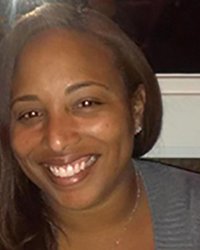Editor’s Note: The opinions expressed in this article are those of the author and do not necessarily reflect the opinions, positions, or the polices of the AAMC or its members.

Undergraduate: University of California, Berkeley
Major: Nutritional science and toxicology
Postbaccalaureate Program: San Francisco State University
Medical School: Case Western Reserve University School of Medicine
I am a 28-year-old, married, African American mother of two. I suppose you could say I took a bit of a scenic route to medical school. During the summer between my second and third year of undergraduate education at the University of California, Berkeley, I got married. The following summer, I had my first child. When I graduated in 2001, I was pregnant with my second child. I spent five years on my undergraduate studies and graduated with a degree in nutritional science and toxicology.
Unfortunately, however, most of my nutrition-related classes were not counted toward my "science GPA," —the grade point average that reflects one's grades in science courses — despite the fact that most of them were rooted in chemistry and biochemistry. Being a doctor was always my dream, so I worried that this would make me a less competitive applicant for medical school. Therefore, I decided to spend a year in a postbaccalaureate program at San Francisco State University, where I could take more biology and chemistry courses.
In the midst of my first semester of study in San Francisco, my second child was born. I studied at home so I could care for our new arrival, and ended up completing my semester with two A's.
After completing the postbaccalaureate program, I decided the time was right to apply to medical school. I worked as a substitute teacher to raise money to cover the application fees. I applied to 20 schools. After five interviews, I was offered a spot at Case Western Reserve University School of Medicine in Cleveland. I accepted because I particularly liked the sound of their Patient-Based Learning program. I also applied for and received a full medical school scholarship from the National Health Service Corps, which covered my tuition, as well as provided me with a monthly stipend for living expenses and school-related costs. In return for this assistance, the NHSC requires me to work in an underserved community when I finish my residency, which is perfect because my goal is to increase access to quality health care for indigenous populations.
I moved my growing family to Cleveland, where we didn't know anyone, and had to start building our lives all over again. I had to find childcare, and my husband had to find a new job. It took a long time for us to get comfortable in our new surroundings, but we have fully acclimated to the changes. My husband has had to provide a great deal of support helping around the house and with our children, who are now almost seven and four years old.
I am now in my fourth year of medical school and have chosen family practice as my specialty. It can be tricky coordinating my call schedule with my husband's work schedule, but we get it done, partly with the help of some of my classmates that we have enlisted to help us with our children when I am on call or not able to get home in time to pick them up from day care.
It is challenging raising a family and attending medical school. I am the only female in my class with children, and certainly was the only person with children in my class when we started medical school. But with organization and forward thinking — such as asking clerkship directors to give me my schedule as early in advance as possible — my husband and I have been able to coordinate our schedules and make it work. I don't feel that I have to sacrifice being a good parent or being a great doctor. I know I will be both.